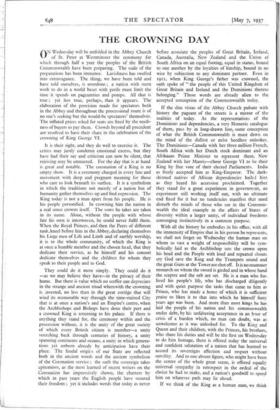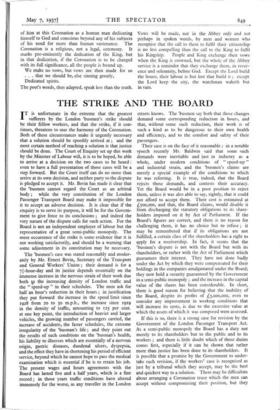THE CROWNING DAY O N Wednesday will be unfolded in the
Abbey Church of St. Peter at Westminster the ceremony for which through half a year the peoples of the British Commonwealth have been preparing. The scale of the preparations has been immense. Lavishness has swelled into extravagance. The thing, we have been told and have told ourselves, is overdone ; a nation with stern work to do in a world beset with perils must limit the time it spends on pageantrics and pomps. All that is true ; yet less true, perhaps, than it appears. The elaboration of the provision made for spectators both in the Abbey and throughout the processional route is of no one's seeking but the would-be spectators' themselves. The inflated prices asked for seats are fixed by the readi- ness of buyers to pay them. Crowds beyond all precedent are resolved to have their share in the celebration of the crowning of King George VI.
It is their right, and they do well to exercise it. The critics may justly condemn emotional excess, but they have had their say and criticism can now be silent, that rejoicing may be unmarred. For the day that is at hand is great and notable. The coronation of a King is no empty show. It is a ceremony charged in every line and movement with deep and pregnant meaning for those who care to look beneath its surface. It is a symbolism in which the traditions not merely of a nation but of humanity gather themselves up and find expression. The King today is not a man apart from his people. He is his people personified. In crowning him the nation in a real sense crowns itself. The vows he takes are taken in its name. Alone, without the people with whose fate his own is interwoven, he could never fulfil them. When the Royal Princes, and then the Peers of different rank, kneel before him in the Abbey, declaring themselves his Liege men of Life and Limb and of earthly worship, it is to the whole community, of which the King is at once a humble member and the chosen head, that they dedicate their service, as he himself and his consort dedicate themselves and the children for whom they speak to their people and to God.
They could do it more simply. They could do it —as we may believe they have—in the privacy of their home. But there is value which no scoffer can depreciate in the strange and ancient ritual wherewith the crowning is ;nvested, no less than in the great cortege that will wind its memorable way through the time-stained City that is at once a nation's and an Empire's centre, when the Archbishops and Bishops have done their part and a crowned King is returning to his palace. If there is anything they stand for, the ceremony within and the procession without, it is the unity of the great society of which every British citizen is member—a unity stretching back through centuries of history, a unity spanning continents and oceans, a unity in which genera- tions yet unborn already by anticipation have their place. The feudal origir s of our State are reflected both in the ancient words and the ancient symbolism of the Coronation service ; the oath the sovereign takes epitomises, as the most learned of recent writers on the Coronation has impressively shown, the charters by which in past years the English people have secured their freedom ; yet it includes words that today as never before associate the peoples of Great Britain, Ireland, Canada, Australia, New Zealand and the Union of South Africa on an equal footing, equal in status, bound to one another by the loyalties of kinship, bound in no wise by subjection to any dominant partner. Even in 1911, when King George's father was crowned, the oath spoke of "the people of this United Kingdom of Great Britain and Ireland and the Dominions thereto belonging." Those words are already alien to the accepted conception of the Commonwealth today.
If the dim vistas of the Abbey Church pulsate with history the pageant of the streets is a mirror of the realities of today. As the representatives of the Dominions and dependencies, a very Homeric catalogue of them, pass by in long-drawn line, some conception of what the British Commonwealth is must dawn on the mind of the dullest or most heedless onlooker. The Dominions—Canada with her three million French, South Africa with her Dutch stock dominant and an Afrikaans Prime Minister to represent them, New Zealand with her Maoris—chose George VI to be their King by free vote of their elected Parliaments. India as freely accepted him as King-Emperor. The dark- skinned natives of African dependencies hailed him as they heard his accession proclaimed. Together they stand for a great experiment in government, an experiment still working itself out, with no ultimate end fixed for it but no tendencies manifest that need disturb the minds of those who see in the Common- wealth the ideal example in the affairs of States of diversity within a larger unity, of individual freedoms converging instinctively in a common purpose.
With all the history he embodies in his office, with all the immensity of Empire that in his person he represents, we shall not forget on Wednesday the human man on whom so vast a weight of responsibility will be sym- bolically laid as the Archbishop sets the crown upon his head and the People with loud and repeated shouts cry God save the King and the Trumpets sound and the great Guns at the Tower are shot off. It is no mummer monarch on whom the sword is girded and in whose hand the sceptre and the orb are set. He is a man who has lived his people's life, who has discharged diligently and with quiet purpose the tasks that came to him as Prince, who has made a home of which it is sufficient praise to liken it to that into which he himself forty years ago was born. And more than most kings he has laid the people of his nation and his commonwealth under debt, by his unfaltering acceptance in an hour of crisis of a burden which, no man can doubt, was as unwelcome as it was unlooked for. To the King and Queen and their children, with the Princes, his brothers, who share his duties and will be the first on Wednesday to do him homage, there is offered today the universal and confident salutation of a nation that has learned to accord its sovereigns affection and respect without servility. And to one absent figure, who might have been the centre of the whole great scene, is offered equally universal sympathy in retrospect in the ordeal of the choice he had to make, and a nation's goodwill to speed him on whatever path may lie ahead.
If we think of the King as a human man, we think of him at this Coronation as a human man dedicating himself to God and conscious beyond any of his subjects of his need for more than human sustenance. The Coronation is a religious, not a legal, ceremony. It marks pre-eminently the dedication of the King, but in that dedication, if the Coronation is to be charged with its full significance, all the people is bound up.
We niake no vows, but vows are then made for us . . . that we should be, else sinning greatly, Dedicated spirits.
The poet's words, thus adapted, speak less than the truth. Vows will be made, not in the Abbey only and not perhaps in spoken words, by men and women who recognise that the call to them to fulfil their citizenship is no less compelling than the call to the King to fulfil his Kingship. People and King exchange their vows when the King is crowned, but the whole of the Abbey service is a reminder that they exchange them, in rever- ence and solemnity, before God. Except the Lord build the house, their labour is but lost that build it ; except the Lord keep the city, the watchman waketh but in vain.















































 Previous page
Previous page